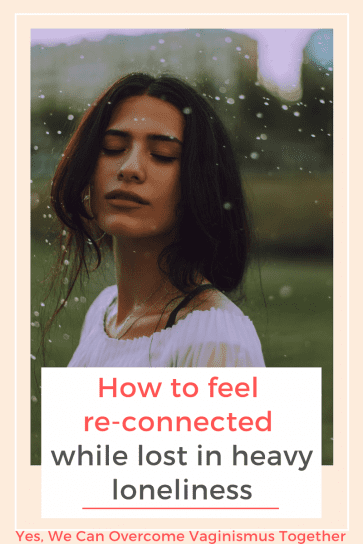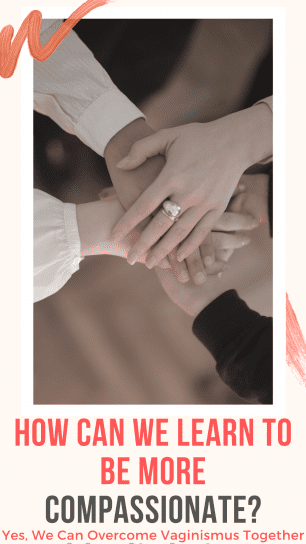Do you also ask this question to yourself? I used to ask quite often while living with vaginismus!
But the thing is, our experience is not about the question itself; rather it’s in the relationship we build with it.
As we think about our struggles with sex, perhaps we feel sorry for ourselves or get angry and hopeless, and most likely, we feel ALONE, and that feels heavy!
Most of the time, feeling alone is inevitable when we feel disconnected, my lovely friend, but how do we feel connected again? That is what we will uncover today in this blog post.
But before we get there, are you new here? Then you’ll have to check out these other helpful blogs that I’ve written to help you overcome your condition.
- How To Deal With Difficulties of Gynecological Examination
- Is The Way We React To Our Hard Moments In Life Related To Our Vaginismus Journey?
- How to Dilate On Our Own While We Can Not Even Look Down There
and of course, you should join our EXCLUSIVE Facebook Community “Yes We Can Cure Vaginismus Together” by clicking here!
Oh and, you can download here your FREE Vaginismus Cure Guide based on my personal experience and research!
Shall we continue, dear?
First, let’s dive into “feeling alone”. When do you start to feel it?
- Perhaps, when we feel different than others,
- Or, when we think we are not understood and heard genuinely,
- Or, when we feel like we do not belong!
These feelings are such a shared feeling among us human beings, dear, but ironically we always feel as though we are the only one in the world at that moment, we can’t stop but to ask, “why me?”
Then, what happens? We tend to isolate ourselves from others, deepening our disconnection within ourselves as well!
But how do we feel re-connected while lost in this heavy loneliness?

The answer to this question is found through practicing compassion, dear.
Compassion is such a powerful attitude that makes us connect within ourselves through understanding others’ suffering.
It’s crucial not to misunderstand this, it’s not a pity: not to say “poor girl”, or “poor me!”, but instead, to say “I see you”, “I feel you!”.
When we practice compassion, we get onto the same eye level of who we are caring for; and we become whole together!
Every person on this planet feels the same way we all feel at some point in our lives.
We can experience them for all sorts of various reasons; the triggers don’t have to be related to vaginismus, but the feelings we all experience are so similar, dear.
Feeling alone, incomplete, not enough, hopeless, disappointed, hatred, anger, joy, contentment, happiness; we all know how to feel like that, right?
So, whenever we feel another person’s pain in our heart, we also feel human; we deeply understand the fundamental reality that what we all experience is a part of being a human!
It’s not a rational understanding, but an understanding from the heart!
That’s why it’s powerful.
Think about yourself experiencing a difficult moment and wanting to share it with a compassionate friend.
What qualities make this person compassionate?
- Is it the way they advise you on what you should do and shouldn’t next time?
- Or, is it the way they interrupt you and start talking about their own experiences about a similar topic?
- Or, is it the way they undermine your experience and recommend you to focus on what you have instead?
- Or, is it how they listen to you and try to understand your feelings even hugging you, and saying, “It might be difficult to feel this way for you now. And I’m sorry for that. I’m here, my dear; it’s going to be alright!”
The answer to that is the last one, right? Being listened to whole-heartedly, seen fully is what we fundamentally need as human beings, dear!
- Wouldn’t it be priceless to be treated like that; to feel very safe, and accepted?
- Wouldn’t you feel normal for what you’ve been through?
- Wouldn’t you feel deeply connected with them?
It’s not just a one-way connection. It’s both giving and receiving, it’s both of you feeling human!
As we feel compassion for others, we also learn to be self-compassionate, therefore getting lost in this question of “Why me?” lessens gradually.
So, how can we learn to be more compassionate?

#1 Being aware of our judgemental attitude when we listen to others
Seeing things without judging first is not that easy, dear.
Literally, every single thing we experience comes through the lens of our minds, which inherently means we are always judging what we are seeing and feeling.
It’s not bad or good; it’s a FACT! But it’s important to see our judgments clearly, as they are.
When it comes to listening and hearing whole-heartedly, our judgments can be very dominant and prevent us from doing so.
Here’s the thing: We tend to believe in our judgments without even realizing their independence from reality, similar to how we believe in those self-judgmental talks we often get lost in!
Remember how hard we can be on ourselves during our self-talk, with thoughts such as:
- You are such a failure!
- What stupid person you are!
- You’ll never overcome it!
When we are not aware of them, it’s also not easy to move on without feeling heavy and low!
To see how judgmental we can be without judging how judgmental we are 😊, now that’s how we practice mindfulness, dear! It is such an endless dilemma: we judge ourselves for judging ourselves and so on 😊
Try getting to know your judgmental thought patterns and befriend them so that you can see the barriers that prevent you from listening to people generously!
#2 Focusing on the feelings of the story rather than the story itself
We all love listening to stories, but what will connect us with them is not the story itself but rather the person’s feelings and emotions told through the story.
It is about understanding their feelings and connecting with them through imagining how it would be to feel like that.
There is a beautiful example in the book Self-Compassion by Dr. Kristen Neff.
I highly recommend you to read it. She gives an example of a homeless man begging for money.
What would you do? What would your first reaction be?
Mine most of the time is to ignore them and not connect with them at all, even judging them for being lazy and taking advantage of other people! Pretty mean, right? I know 😊
In the book she says: “Rather than rushing past a homeless man begging for change on your way to work, for example, you might actually stop to consider how difficult his life must be. The moment you see the man as an actual human being who is suffering, your heart connects with him (compassion literally means “to suffer with;” see Chapter 1). Instead of ignoring him, you find that you’re moved by his pain, and feel the urge to help in some way.
And importantly, if what you feel is true compassion rather than simply pity, you may say to yourself, “There but for the grace of God go I. If I’d been born in different circumstances, or maybe had just been unlucky, I might also be struggling to survive. We’re all vulnerable.” “
And so seeing this person beyond our judgments will help us with connecting!
#3 Practicing generosity without expecting anything in return
Connecting with people to change our emotional state from feeling lonely as soon as possible, is not how it works dear. The eagerness here should not be to change how we feel, but rather have a human connection.
The transformation from loneliness into feeling not alone happens naturally, without forcing or aiming, dear!
While being generous, trying not to expect anything in return like respect or validation is the key.
But how will we stop expecting anything in return?
We even might notice in our loving relationships that we do things because we expect some particular things in return. This makes it conditional love, not unconditional, which is not bad or good again; it’s the matter of how much we get lost in our expectations that can end up with disappointment and suffering.
That’s why we exercise our Loving & Kindness practices, to experience sending well wishes to people we know and don’t know well while remembering that they are suffering for whatever reason and because of this we wish them to be happy, strong, free of their suffering!
It’s such a healing practice that cultivates generosity with our time and love, which is tremendously helpful for opening and largening our hearts and becoming more compassionate people; compassionate towards others and ourselves as well!
So while living with vaginismus, whenever we struggle with the question of:
- Why me?
- Or, when others have a fantastic sex life, why can’t I?
Connecting within ourselves and knowing what we have been through is part of what life is all about will be inevitable as we become more compassionate people, dear!
We all deserve to be treated with compassion, love, and kindness, ALWAYS! And the power of this attitude is within us!
Let’s awaken it TOGETHER!
Join our private group of women supporting women with vaginismus HERE, to share together and grow together.

“When you begin to touch your heart or let your heart be touched,
you begin to discover that it’s bottomless, that it doesn’t have any resolution,
that this heart is huge, vast, and limitless.
You begin to discover how much warmth and gentleness is there, as well as how much space.”
Pema Chödrön
You can download my free vaginismus overcoming guide from here if you haven’t yet.
If you found this article helpful, then come and join our free online community Yes We Can Cure Vaginismus Together, if you haven’t yet.
I talk more about these topics and in more detail.
Let’s meet there. Let’s grow together.

E-mail: petek@yeswecancure.com
Related Blog Posts:
Why Challenging Ourselves Matters Especially While Overcoming Our Vaginismus
How to Transform Our Relationship to Pain When Living With Vaginismus


